OPINION: The residential parking situation is inconvenient and unfair to on-campus students
With the start of a new semester, both new and returning on-campus students moved into their new housing assignments excited for an in-person experience, the first for some since the pandemic’s initial outbreak. The delta variant continues to threaten that hope, but campus life has persisted in spite of it, allowing a sense of normalcy to return to the college environment. However, an unexpected beast arose in this perfect storm of returners—namely, the wildly oversaturated parking situation on campus.
The construction of Terrapin and Loggerhead halls finalized over the summer and the west side of campus now houses more students than ever before. Many freshmen as well as sophomores live in the new dorms after the housing changes of last semester. Thus, the area surrounding The Hub is now the most highly active residential campus area.
With this change, though, the parking situation in that area has seen little adjustment. There are two kinds of passes that on-campus students can purchase—a residential pass or a residential deck pass. The residential is the more basic of the two and allows students to park in any designated residential area across campus. These lots border all living spaces, covering the south and west sides of campus. The deck pass, costing an extra $70, gives students access to one of the two parking decks available on either side of campus. These multi-level, covered structures offer a fair number of spots, but it comes with the inability to park anywhere besides the selected deck.
Before this year, it was clear where students from each residential area were supposed to park simply by noting the zones bordering their residence. Reigel Road, the only residential zone available near the academic side of campus, was a neutral ground where students parked when traveling to classes. This has all changed.
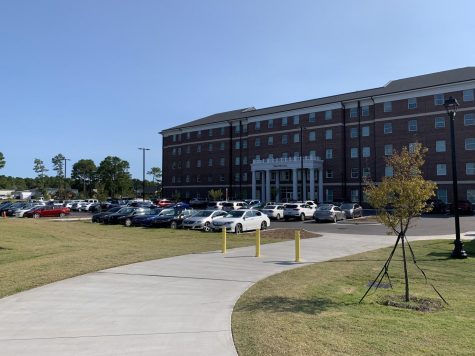
Previously, the two lots to either side of Graham-Hewlett Hall were reserved primarily for the freshmen living in that dorm, with the one bordering Belk Hall available for students living in Pelican, Sandpiper, and Belk halls. These lots now face immense oversaturation with the addition of Terrapin and Loggerhead residents. The only new add-ons are a lot on the east side of Terrapin and a dirt lot next to the recreational fields, but these do not offer more than 60 spots each. This means that the three parking areas bordering the residential halls of The Hub must now accommodate the hundreds of Terrapin and Loggerhead residents as well as the usual crowd of freshmen. The first week on campus, several new residents at Terrapin and Loggerhead parked their cars on the side of the road bordering their dorms, but over-priced parking tickets quickly drove them away.
Students in other dorms, such as Schwartz and the Tri-House area, have also struggled to find adjacent parking. The lot alongside Schwartz and the strip bordering the University Suites experiences the brunt of the overflow from The Hub. This results in the displacement of “Schwuites” residents from their own parking area. The Tri-House, too, struggles with a simple lack of parking, as residents from Cornerstone, Keystone and Innovation halls as well as the on-campus apartments share the same lots.
This addition of students without an increase in parking has created a ripple effect for upperclassmen parking. The freshmen and sophomores that would normally park near their buildings now fall back into upperclassmen lots, extending the oversaturation. Before this year, evenon-campus apartment residents have experienced some frustrations. There is only one row of neighboring spots available for the Seahawk Crossing students before they are pushed into the Landing lot, and Village students in the buildings closest to the Suites are pushed back when those residents avoid the overflow lot. Upperclassmen are also the furthest from the academic side of campus, making Reigel Road an essential parking place for them during the day. However, it has become unreliable as freshmen and sophomores residing in The Hub area park there consistently. Less spots open on Reigel means more time spent travelling to classes for the upperclassmen.
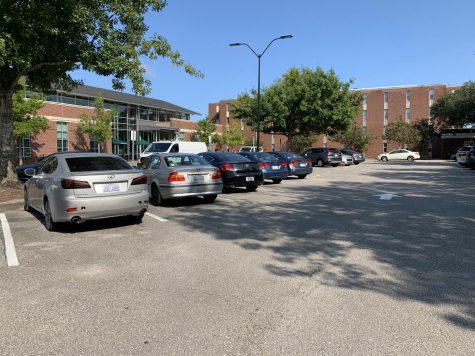
The residential parking pass is $390 for an entire school year, a price that is not reasonable in the context of this semester’s parking situation. It has become inconvenient and unfair to on-campus students who buy a pass expecting consistent access to parking spots near their residential hall.
The only solutions that have been offered are the aforementioned new lots, their supply insufficient to meet demand, and the overflow lot behind the Suites. There are two problems with the Suites’ lot—firstly, its distance from the rest of campus; secondly, how unsafe it is at night. The walk alone is irritating, but also frightening in a poorly lit, secluded area where campus police are rarely present. There have been multiple times where I have asked a friend to ride there and walk back with me so that I would feel safe.
Overall, the situation is frustrating. No attempts have been made so far to fix the parking problem or even acknowledge it. While there are fewer issues in the other residential areas, the side of campus that desperately needs it is underserved.
This is not the first time that the campus-wide parking situation has been criticized.
Off-campus students that live within a mile of campus must either take the provided shuttles, pay for a parking spot every time they commute or bike to campus. This has been a cause of frustration for some time, making it difficult to make it to classes in the event of harsh weather or something as simple as running late. In general, there is a trend in a lack of parking available on campus for the thousands of students that attend UNCW annually. Something must be done to improve the system.
The issue primarily stems from a lack of parking overall, for both on and off-campus students. It is unlikely that any immediate change can happen—planning parking zones takes time, money and land availability—but there are a myriad of solutions available that would assuage this for the next academic year.
On the west side of campus, an excellent option would be selling residential parking passes by zone, rather than by the number of spots available throughout campus. Coming into this year, that is what I assumed was already being done, only to be proven wrong by the situation. By enforcing this, students are assured parking near their dorms.
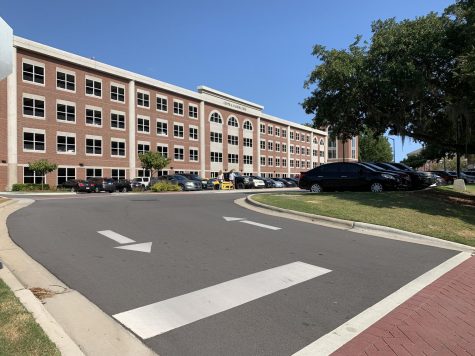
However, in addition to this, the lots around the Hub would need to be expanded, or new ones would need to be added on. The Central Parking Deck is a help to the situation, but it is more expensive and less convenient for getting around campus for those students who prefer what the residential pass offers. With the amount of students that live in that area, it is a necessary step regardless of the current policy. There are simply hundreds of residents to accommodate due to campus’ layout, and even a parking deck cannot cover the leftover needs.
Another solution would be to rearrange the layout of the zones entirely—that is, change what lots are residential, faculty and staff, and commuter to best facilitate each group’s needs. With changes happening rapidly to campus’ infrastructure, it may be time for the parking system to adjust to a new layout. Through some simple statistical research, the office can decide what the best and most realistic course of action would be to improve the situation for everyone, so that campus activities may run more smoothly.
In an immediate sense, though, simply installing more lighting in the Suites’ overflow lot would be an excellent first step. Even the residents that live closest to that lot often feel uneasy at night, so providing better lighting and even some sort of security system there would provide a sense of solidarity for students that have felt inconvenience over parking.
There is no perfect solution. There is no way to ensure that every member of UNCW’s community has access to the most convenient option possible. But the current situation is no longer covering the necessary bases, now that campus is back to full capacity. The oversaturation in certain parking areas is clear to the residents that reside there and consistently struggle with transportation. When the structure of campus changes with two new, five-story dorms being filled, the parking situation needs to as well.






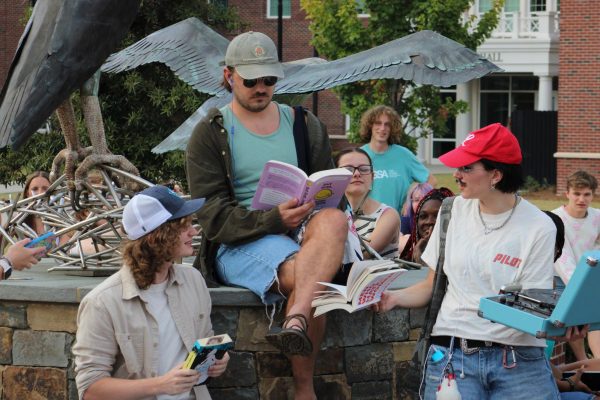
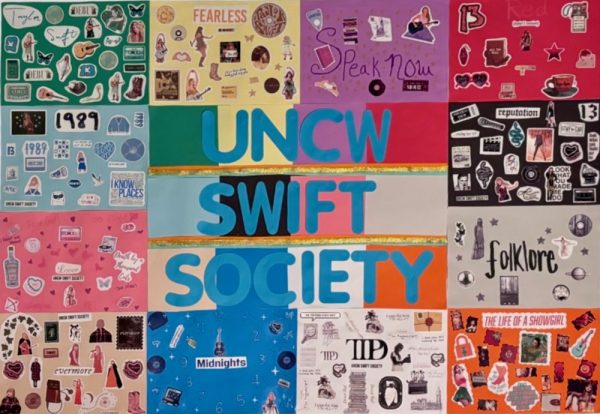



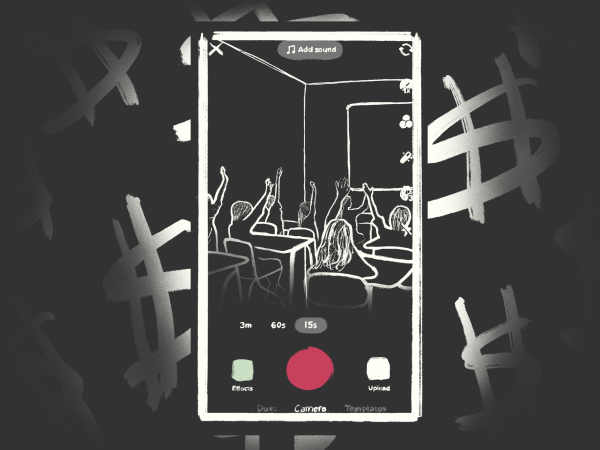

Chris Dumas • Nov 22, 2021 at 1:37 pm
There are probably 30 spots free every day, all day, in the faculty parking area on the ramp between the 1st and 2nd level of the parking deck beside Dunkin Donuts. I know, because I park there every day. Most of these free spots could be reallocated to students, at least until we hire more faculty. -Dr. Dumas